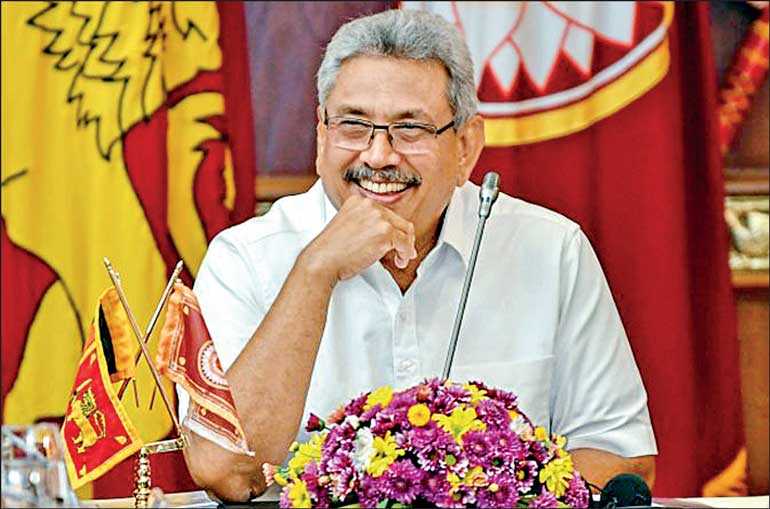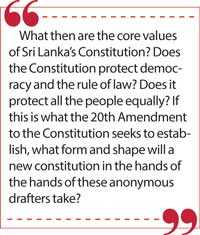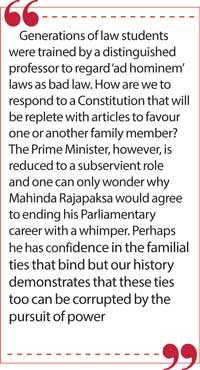Tuesday Feb 17, 2026
Tuesday Feb 17, 2026
Friday, 25 September 2020 00:00 - - {{hitsCtrl.values.hits}}

It is the most tragic of ironies that through the 20th Amendment, Parliament is being engaged to strip itself of all its powers and vest them in the hands of one man – the President. This charade is referred to as an expression of the sovereignty of the people
By Dr. Sakuntala Kadirgamar
Last week (15 September) International Democracy Day was celebrated and we in Sri Lanka also celebrated it with statements made by the Prime Minister and the Leader of the Opposition confirming Sri Lanka’s commitment to democracy. But how deep and how widespread and how true is our commitment to democracy, besides voting periodically at elections?
We are right in the middle of the first of a series of challenges that we will face. The 20th Amendment to the Constitution that is widely discussed does more than repeal the preceding 19th Amendment that the Government criticises for being poorly drafted and replete with inconsistencies. The 20th Amendment takes the country backwards to an era of uncontrolled presidential powers.
It is also a window into the soul of its sponsors and drafters of the amendment. What form and shape will we expect the ‘new constitution’ to take if these are the amendments to be made during the transition?
The majority of the constitutional amendments that were made to the 1978 Constitution were undertaken to suit the party in power. There was an accumulation of powers in the hands of the President. Parliament played the role of a rubberstamp and endorsed all the amendments.
Have we forgotten that every parliamentarian within the ruling party was ‘persuaded’ to give President Jayewardene undated letters of resignation? This effectively served as a gag order on them and they uncritically towed the President’s line.
Manipulating the Constitution
Over a period of 37 years governments fell to new lows in manipulating the Constitution to fit their purposes. So discredited was this constitution that every presidential candidate promised to replace it.
The few amendments that did not directly favour the ruling party of the day included the 13th Amendment (now so vehemently criticised although many enthusiastically contested Provincial Council Elections in the past), the 17th Amendment that promised the de-politicisation of appointments to independent commissions and the 19th Amendment that limited some of the excessive presidential powers and restored the independent commissions.
These excessive powers include the power to dismiss the prime minister and Parliament even when the prime minister was supported by a functional majority, to create of a transparent and inclusive process for key public appointments, limited the president’s powers to create outsize cabinets (largely established as a form of political patronage and securing compliance) and re-introduced term limits for presidential terms.
It has also brought judicial appointments under the President removed two vital commissions (the Audit and Procurement Commissions) and by eliminating the Constitutional Council and establishing a weak Parliamentary Council in its place, ensured that appointments to key commissions will not be made on the basis of impartial and non-partisan process.
The Constitutional Council created the opportunity for consociational decision-making and that too is removed. The introduction of the clause to enable dual citizens to contest Parliament is publicly referred to as the ‘Basil Rajapaksa’ clause to enable one man to run for office. None of the Government ideologues have any qualms about defending this partisan measure.
‘Ad hominem’ laws
Generations of law students were trained by a distinguished professor to regard ‘ad hominem’ laws as bad law. How are we to respond to a Constitution that will be replete with articles to favour one or another family member?
The Prime Minister, however, is reduced to a subservient role and one can only wonder why Mahinda Rajapaksa would agree to ending his Parliamentary career with a whimper. Perhaps he has confidence in the familial ties that bind but our history demonstrates that these ties too can be corrupted by the pursuit of power. Think Sigiriya!
It is ironical that as the subcontinent mourns and honours Swami Kesavananda Bharati, ‘the Seer who saved India’s democracy,’ who passed away on Sunday 6 September 2020, Sri Lanka is hurtling towards destroying the basic structure of democracy in the country.
In that remarkable case, Kesavananda Bharati Sripadagalvaru and Ors. v. State of Kerala & Anr. the Supreme Court of India opined: “The power of amendment...does not include the power to abrogate the Constitution nor does it include the power to alter the basic structure or framework of the Constitution.”
Indian Constitution
The opinions of the various judges in that case gave the Indians much to think about relating to what constitutes the basis structure of the Indian Constitution and the underpinnings of their complex multi-ethnic and multi religious societies that have held together as a vibrant democracy against all odds and expectation. While our own Constitution and its development is unique to Sri Lanka, should we not, as citizens, expect some core values and higher goals to be included in this and any succeeding Constitution?
In India the courts have reflected around the criteria that collectively constitute the basic structure of the constitution that cannot be amended as it would undermine the Constitution. The supremacy of the Constitution, the republican and democratic form of government, the secular character of the Constitution, Parliamentary democracy with the separation of powers between the Legislature, Executive and the Judiciary, the federal character of the Constitution, the mandate to build a welfare state contained in the Directive Principles of State Policy, the unity and integrity of the nation, the sovereignty of India, the democratic character of the polity, the unity of the country, the essential features of the individual freedoms secured to the citizens are among the elements, the Courts remarked, constitute the basic structure of the Indian Constitution. It has an unbroken history and generated a rich jurisprudence since it was adopted in 1949 and brought into effect in 1950.
Sri Lanka’s Constitution
What then are the core values of Sri Lanka’s Constitution? Does the Constitution protect democracy and the rule of law? Does it protect all the people equally? If this is what the 20th Amendment to the Constitution seeks to establish, what form and shape will a new constitution in the hands of the hands of these anonymous drafters take?
It is the most tragic of ironies that through the 20th Amendment, Parliament is being engaged to strip itself of all its powers and vest them in the hands of one man – the President. This charade is referred to as an expression of the sovereignty of the people.
(The writer is LST Executive Director.)